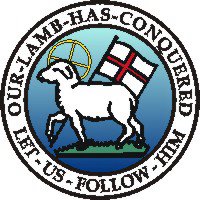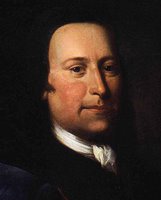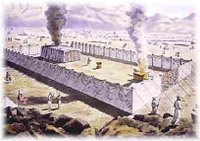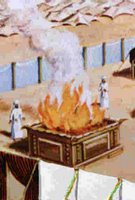 |
| Moravian Seal |
Pray & Read Leviticus 6:8-13
Have you ever heard of the Moravians? Maybe you hang a Moravian star at Christmas, or maybe you have eaten one of those marvelous Moravian cookies or sweet breads. We have a strong Moravian heritage in North Carolina. Many of our early colonial records are in German, written by the Moravians, some of the few people in North Carolina who read and wrote well enough to keep records at that time!
The Moravians’ origin is wrapped up in a heritage of fidelity to God’s Word, and though today many Moravians do not have the reputation of being very Biblical, we can identify with their history of prayer, the Word of God, repentance, and revival.
The Moravians’ origin is wrapped up in a heritage of fidelity to God’s Word, and though today many Moravians do not have the reputation of being very Biblical, we can identify with their history of prayer, the Word of God, repentance, and revival.
John Hus (1369-1415), a philosophy professor and rector at the University of Prague, was their founder. When he preached the Scripture and criticized practices in the Catholic Church, the Church authorities invited him to the Council of Constance “just to talk and present his views.” When he arrived, they promptly arrested him and burned him at the stake.
| Praying Moravians. bottom: men; top: women, Lamb of God (Photo credit: Wikipedia) |
From there developed the Unitas Fratrum, the unity and priesthood of all the body of believers and the well-known phrase, “In essentials, unity, in non-essentials, liberty, in all things, charity (love).” Moravians were the first Protestants.
Their movement was 60 years before Martin Luther began his reformation, 100 years before the establishment of the Anglican Church, and nearly 200 years before the origin of Baptists as we know them.
After several hundred years of persecution, the Moravians fled southern Germany and settled in what is now the Czech Republic, on the estate of a nobleman named Nikolaus, Count Ludwig von Zinzendorf. In such close quarters, the Moravians began to turn on each other in quarrelling, gossip, slander, offense, and bad feeling. The unity of all the body of believers was beginning to unravel.
 |
| Zinzendorf |
Zinzendorf cried out to God for direction to save the Moravians. The Lord directed him to this passage and commanded him, “The fire on the altar must burn continuously, it must not go out.” While Zinzendorf prayed, God worked, and brought a great revival of repentance among the Moravians. In the midst of revival, Zinzendorf presented Leviticus 6:13 to the congregation, and they established “Hernhut,” The Lord’s Watch, a 24-hour prayer meeting that lasted for 120 years.
Textual Notes
Exodus ends with God’s glory filling the Tabernacle. Leviticus teaches us how to worship Him. Leviticus is a worship manual. Leviticus shows us Jesus Christ, both our Sacrifice for sin and our Consecrated High Priest. Embracing one month of time at the foot of Mount Sinai, Leviticus could well be called one of the most remarkable books of the Old Testament. God does not speak from the Mount, but he moves into the Tabernacle and speaks from the Tent.
us Jesus Christ, both our Sacrifice for sin and our Consecrated High Priest. Embracing one month of time at the foot of Mount Sinai, Leviticus could well be called one of the most remarkable books of the Old Testament. God does not speak from the Mount, but he moves into the Tabernacle and speaks from the Tent.
Textual Notes
Exodus ends with God’s glory filling the Tabernacle. Leviticus teaches us how to worship Him. Leviticus is a worship manual. Leviticus shows
 us Jesus Christ, both our Sacrifice for sin and our Consecrated High Priest. Embracing one month of time at the foot of Mount Sinai, Leviticus could well be called one of the most remarkable books of the Old Testament. God does not speak from the Mount, but he moves into the Tabernacle and speaks from the Tent.
us Jesus Christ, both our Sacrifice for sin and our Consecrated High Priest. Embracing one month of time at the foot of Mount Sinai, Leviticus could well be called one of the most remarkable books of the Old Testament. God does not speak from the Mount, but he moves into the Tabernacle and speaks from the Tent.Leviticus teaches that the way to God is by sacrifice (Atonement is found 45 times), the walk with God is by holiness (Holiness qodesh is found 87 times, sanctify is found 17 times; the root q-d-sh “holy” in adjective, noun, and verb forms is found 152 times), and the worship of God is through celebration. Leviticus teaches us that the Chapters 1-7 teach how to get right with God through the sacrifices. Chapters 8-22 teach how to be holy. Chapters 23-27 teach us how to celebrate the Lord.
The first five chapters explain the offerings, and beginning in chapter six, Moses gives more practicalities for the priests in regard to the offerings. He begins with the burnt offering.
Burnt Offering:
Offering of Dedication (Romans 12:2)
Voluntary Offering symbolizing complete surrender to God
Offerer lays hands on animal. Priest kills it. Fire consumes the blood & carcass (Galatians 2:20; Hebrews 12:24)
"Take My Life and Let it Be" Burnt Offering

INSIGHTS To what is the Lord Calling Us?
1. Intercessory Prayer: (v. 9, 12)1.1. Occupation of a priest, standing between the need and the Need-Meeter. (Hebrews 1:3; 4:14-16; 10:11-14)
1.2. Divine Fire B Humanly Maintained (1 Thessalonians 5:16-20)
1.2.1. Through Watchfulness of People B v.9 (Isaiah 62:6-7)
1.2.2. Through Active Maintenance v. 12
2. Worship:
2.1. No Old Fires (v. 13)
2.1.1. Fresh Wind, Fresh Fire – So many churches are like old hearths, cold, but polished, beautiful, cared-for, but no fire there in years.
2.2. Voluntary Offering of Entire Consecration (the Sin offering being for man, this one is for God) (2 Timothy 1:6; Jeremiah 20:9; John 10:18)
2.3. Implicit Warning: No Strange Fires B Leviticus 10:1-2
2.5. Act of Worship (Romans 12:1-2)
Tom Hess, The Watchmen, pp. 110-111:
"In 1727 the Holy Spirit came upon them as they were in prayer, showing them to start praying and worshiping 24 hours a day. This 24-hour watch, "The Lord's Watch" (Herrnhut), continued about 120 years. . .
"They understood that "the fire must be kept burning on the altar continuously; it must not go out" (Leviticus 6:13). The fire on the altar must always be burning, 24 hours a day, so they needed to keep 24-hour prayer going continuously. They were the Temple of the Holy Spirit and could not allow the fire on the altar to go out.
"They began with 24 men and 24 women, each praying an hour a day, around the clock. Their numbers grew, and 24-hour prayer continued for about one hundred twenty years. Tremendous blessing, both in the spirit and in the natural, came to this area. John Wesley visited them, saying he wished he could have spent the rest of his life there, because the glory of the Lord was covering the place as the waters cover the seas!"
3. Humility: (v. 9)
3.1. Humble Duty to Tend the Fire, Ashes
3.2. The Smell, the smoke, the lack of sleep, the dirty work.
4. Holiness: (v. 10)
4.1. Priest Must Wear Holy Attire (Linen imported from Egypt where it was priestly attire as well.
4.2. Jesus wore a seamless undergarment on the to the Crucifixion and was wrapped in linen at his burial as our priest and as a sacrifice at the same time. (Psalm 24:3-4; John 19:23, 40)
1.2. Divine Fire B Humanly Maintained (1 Thessalonians 5:16-20)
1.2.1. Through Watchfulness of People B v.9 (Isaiah 62:6-7)
1.2.2. Through Active Maintenance v. 12
2. Worship:
2.1. No Old Fires (v. 13)
2.1.1. Fresh Wind, Fresh Fire – So many churches are like old hearths, cold, but polished, beautiful, cared-for, but no fire there in years.
2.2. Voluntary Offering of Entire Consecration (the Sin offering being for man, this one is for God) (2 Timothy 1:6; Jeremiah 20:9; John 10:18)
2.3. Implicit Warning: No Strange Fires B Leviticus 10:1-2
2.5. Act of Worship (Romans 12:1-2)
Tom Hess, The Watchmen, pp. 110-111:
"In 1727 the Holy Spirit came upon them as they were in prayer, showing them to start praying and worshiping 24 hours a day. This 24-hour watch, "The Lord's Watch" (Herrnhut), continued about 120 years. . .
"They understood that "the fire must be kept burning on the altar continuously; it must not go out" (Leviticus 6:13). The fire on the altar must always be burning, 24 hours a day, so they needed to keep 24-hour prayer going continuously. They were the Temple of the Holy Spirit and could not allow the fire on the altar to go out.
"They began with 24 men and 24 women, each praying an hour a day, around the clock. Their numbers grew, and 24-hour prayer continued for about one hundred twenty years. Tremendous blessing, both in the spirit and in the natural, came to this area. John Wesley visited them, saying he wished he could have spent the rest of his life there, because the glory of the Lord was covering the place as the waters cover the seas!"
3. Humility: (v. 9)
3.1. Humble Duty to Tend the Fire, Ashes
3.2. The Smell, the smoke, the lack of sleep, the dirty work.
4. Holiness: (v. 10)
4.1. Priest Must Wear Holy Attire (Linen imported from Egypt where it was priestly attire as well.
4.2. Jesus wore a seamless undergarment on the to the Crucifixion and was wrapped in linen at his burial as our priest and as a sacrifice at the same time. (Psalm 24:3-4; John 19:23, 40)
5. Service: (v. 11)5.1. Change Clothes to Go out in Service & Mission (A picture of the Great Commission) Matthew 28:19
MORAVIAN MANDATES
Jewish People: Comforted, prayed for, led Jewish people to Messiah.
Unitas Fratrum: Unity of the Body of all Believers.
Twenty-four hour prayer: Result was a world vision!
Sending Missionaries: First Protestant missionary movement - 300 missionaries in 65 years. First ones sold themselves as slaves to reach African diaspora in the West Indies.

Moravians in Carolina
Lord Granville was converted under the ministry of George Whitefield in England during the First Great Awakening. In gratitude, he gave Whitefield 98,985 acres in Carolina. Not having any use for the land (He was a traveling evangelist); he offered it to the Moravians.
MORAVIAN MANDATES
Jewish People: Comforted, prayed for, led Jewish people to Messiah.
Unitas Fratrum: Unity of the Body of all Believers.
Twenty-four hour prayer: Result was a world vision!
Sending Missionaries: First Protestant missionary movement - 300 missionaries in 65 years. First ones sold themselves as slaves to reach African diaspora in the West Indies.

Moravians in Carolina
Lord Granville was converted under the ministry of George Whitefield in England during the First Great Awakening. In gratitude, he gave Whitefield 98,985 acres in Carolina. Not having any use for the land (He was a traveling evangelist); he offered it to the Moravians.
The Moravians had been praying in their "Hourly Intercession" for a missionary base to reach out to the Cherokee and Creek Indians. They took the land. When Bishop Augustus Spangenberg, head Moravian in America signed the documents for the land, he signed "Lord Jesus Christ." The first thing they did was to dedicate this land for prayer forever.
INVITATION:
To keep the fire burning – deeper, more fulfilling prayer life
Salvation – Profession of faith
Believers’ baptism
Join the Church
Commit to the mission field
INVITATION:
To keep the fire burning – deeper, more fulfilling prayer life
Salvation – Profession of faith
Believers’ baptism
Join the Church
Commit to the mission field

wow that's great.
ReplyDeleteThis is extremely insightful even as we are called to be consistent with God!
ReplyDeleteAm very encouraged and inspired by this article to pray unceasingly!
ReplyDelete